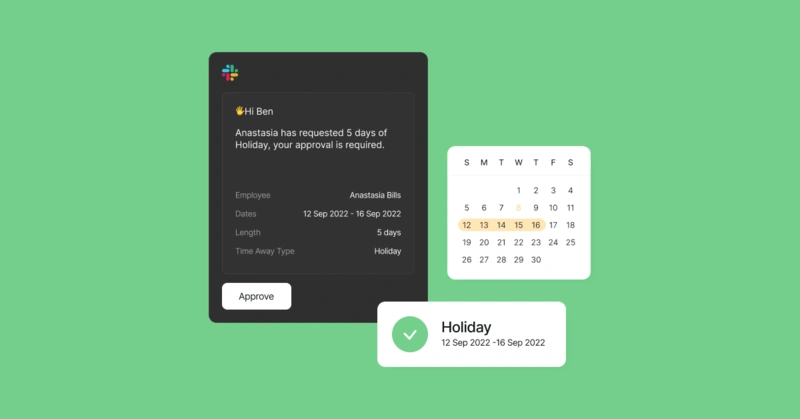Time Off in Lieu (TOIL): Implementing effective policies in the UK
Many UK companies use Time Off in Lieu (TOIL) to let employees take time off instead of getting overtime pay. This approach rewards staff for extra work without increasing costs. Since TOIL is similar to other types of leave, it’s easy to manage within existing systems and processes.

What is TOIL?
TOIL allows employees to take time off later in exchange for extra hours they’ve worked. It’s a win-win: employers can manage overtime costs, and employees gain more flexibility for balancing work and personal commitments. It’s important to note that TOIL is separate from statutory leave entitlements.
What is a day in lieu?
A ‘Day in Lieu’ is a type of TOIL day for working on a public holiday, like a bank holiday. It ensures employees get their rightful time off even if they’ve worked on a day typically reserved for rest. This is a common practice that helps maintain fairness in the workplace.
Do all employees have to work overtime?
Not at all! Overtime isn’t mandatory unless it’s in the employee’s contract. Even then, the Working Time Regulations 1998 cap working hours, including overtime, at 48 per week unless employees opt out in writing. Employers aren’t legally required to pay for overtime or offer TOIL; both are discretionary practices. TOIL policies can vary widely between organisations.
Are all employees in the UK entitled to TOIL?
No, TOIL isn’t a legal entitlement in the UK. Its provision is up to the employer’s discretion. If TOIL is offered, it’s vital to outline it clearly in employment contracts to ensure fair allocation and prevent disputes.
For more guidance, check out the ACAS Holiday Pay Calculator to understand holiday pay calculations when TOIL is involved.
Can employees be paid in lieu of taking holiday?
Employers in the UK don’t have to pay for overtime as long as an employee’s total pay doesn’t fall below the National Minimum Wage. While some employers choose to pay for overtime, others offer TOIL as a cost-effective alternative.
However, employees can’t choose to receive payment instead of taking their statutory leave—this is known as ‘payment in lieu.’ The only exception is when an employee is leaving their job. In such cases, employers are legally required to pay for any accrued but unused statutory leave. For more information, check out the gov.uk holiday entitlement guide or the Working Time Regulations 1998.
This ensures employees take the leave they’re entitled to while keeping the workplace compliant with UK laws.
How should employers track TOIL?
Keeping tabs on TOIL doesn’t have to be complicated. With the right tools, tracking and managing TOIL is straightforward. If you choose the right payroll software you can streamline this process meaningfully.
Transparency is key. When employees clearly understand how TOIL is earned, tracked, and used, it empowers them and fosters a positive, trust-based workplace culture.
How to calculate time off in lieu
Calculating TOIL is simple: track the exact amount of overtime worked and grant the same amount of time off. For example, if an employee works 8 extra hours over a weekend to complete a project, they accrue 8 hours of TOIL, which they can take as paid time off later.
Using a system that automatically calculates leave entitlements can make this process even easier, reducing errors and ensuring transparency for both employees and managers.
Download the Free Zelt TOIL Policy Template
Need help creating your TOIL policy? Download our free, customisable Zelt TOIL policy template to build a policy tailored to your business needs. It’s a simple way to ensure fairness and efficiency in managing overtime and time off.
Advantages & disadvantages of Time Off in Lieu
Offering Time Off in Lieu has multiple benefits for both employer and employees:
- Cost-Effective: A great way for employers to manage overtime without increasing payroll expenses
- Increased Productivity: Employees are often more willing to put in extra hours when they know they’ll be compensated with time off
- Employee Motivation: Flexible time off options can improve morale and job satisfaction
- Work-Life Balance: TOIL encourages a healthy work-life balance when managed properly
As we’ve seen, though TOIL has many advantages, there are also a few drawbacks to be weary of:
- Staffing Challenges: Granting TOIL can be difficult in understaffed environments, potentially leading to scheduling conflicts
- Administrative Burden: Without appropriate systems, managing TOIL can become complex and time-consuming
- Cultural Impact: Over-reliance on TOIL may inadvertently encourage excessive overtime, affecting workplace culture and employee experience
National Minimum Wage and TOIL
If your workplace offers TOIL, it’s crucial to know how it interacts with the National Minimum Wage.
Here’s the deal: if your employees are earning close to the National Minimum Wage, working overtime could accidentally push their average hourly rate below the legal threshold. To avoid this, you need to ensure they’re fairly compensated—either with pay or equivalent TOIL for their extra hours. Keeping this in check helps you stay compliant and keeps your team happy.
How to include TOIL in your employment contracts
If your business offers Time Off in Lieu (TOIL), having a clear policy in place is essential for fairness and efficient management. A well-structured TOIL policy ensures transparency and helps prevent confusion for both employees and managers. To make sure your TOIL policy is effective and comprehensive, address these critical points:
1. Accumulation of TOIL
Specify when employees can earn TOIL and ensure there are clear guidelines:
- TOIL should only be accrued for pre-approved overtime or hours worked beyond the employee’s contracted schedule. For instance, unapproved late finishes or skipped lunch breaks should not automatically qualify
- Clarify that TOIL accrues on a one-to-one basis (e.g., one hour of overtime equals one hour of TOIL)
2. Replacement of Overtime Pay
Clearly communicate that TOIL is provided instead of overtime pay.
- Include examples: If employees work extra hours, they will receive time off rather than additional pay. This ensures everyone understands the arrangement
- Mention exceptions, if any, where overtime pay might be offered instead, such as during peak periods
3. Usage Guidelines
Outline how employees can use their accrued TOIL:
- Make TOIL subject to manager approval to ensure leave doesn’t disrupt business operations
- Specify whether TOIL can be taken during busy periods or if blackout dates apply
- Include minimum increments for taking TOIL, such as a half-day or full-day, to simplify scheduling
4. Expiry Dates
Set a timeframe for using accrued TOIL to avoid it building up indefinitely:
- Align the expiry with key dates, such as the end of the financial year, tax year, or calendar year
- Alternatively, require employees to use TOIL within a set period (e.g., 3 months from the date it was earned)
- Clarify what happens if TOIL isn’t used before the deadline (e.g., forfeited or paid out)
5. Maximum Accrual Limits
Prevent excessive TOIL accumulation by setting caps:
- Specify a limit, such as 40 hours of TOIL at any given time or 10 hours per month
- Explain what happens if the limit is reached (e.g., overtime must be compensated with pay)
6. Recording and Tracking TOIL
Establish procedures for tracking TOIL to ensure accuracy:
- Require employees to log overtime using a time-tracking system or manual forms
- Managers should review and approve logged hours to prevent discrepancies
- Use HR or payroll software to automate tracking and ensure transparency
7. Unused TOIL Upon Termination
Define how unused TOIL will be handled when employees leave the organisation:
- Specify whether unused TOIL will be paid out at their regular hourly rate
- Alternatively, allow employees to use accrued TOIL during their notice period, subject to business needs
Additional Considerations for TOIL Policies
Limiting TOIL During Busy Periods
During high-demand periods, it may be necessary to restrict the use of TOIL to ensure that your team remains adequately staffed and operations run smoothly. These peak times could include the holiday season, major project deadlines, or year-end financial reporting periods.
By identifying these critical periods in advance and clearly communicating them in your TOIL policy, you can set expectations and minimise disruption. For example, the policy could specify that TOIL requests during these times will only be approved under exceptional circumstances or that employees may need to delay taking TOIL until the demand subsides. Providing clear guidance ensures that both managers and employees understand the limitations, helping to maintain productivity and prevent misunderstandings.
Preventing Abuse of TOIL
To prevent misuse of TOIL, it’s important to establish clear guidelines around what qualifies as authorised overtime and ensure these rules are strictly followed. For instance, the policy should state that overtime must be pre-approved by a manager to qualify for TOIL. This prevents employees from working unnecessary or unproductive extra hours simply to bank TOIL for future use.
Additionally, regular reviews of TOIL records by managers can help ensure compliance and identify any irregularities. By requiring managerial oversight and maintaining transparency in how TOIL is accrued, your business can create a system that remains fair, efficient, and aligned with operational needs. This approach helps balance employee flexibility with organisational goals, ensuring TOIL serves its intended purpose.
How Zelt can help
Running a TOIL policy doesn’t have to be overwhelming, especially if you have the right tools in place. Here’s how Zelt can make managing TOIL a breeze:
Transparency
Zelt is designed with both employees and managers in mind. Instead of catering only to HR or IT, it ensures everyone in your organisation knows how TOIL works, how it’s earned, and when it can be used. Transparency like this helps prevent misunderstandings and keeps everything running smoothly.
Unified & People-Centric
Zelt simplifies workforce management by putting everything in one place. Employees can track their leave balances and apply for TOIL easily, while managers can handle approvals seamlessly. No more siloed systems—just a single, people-friendly platform.
Want to explore more ways to create a positive work environment? Check out our article on improving the employee experience.
Frequently Asked Questions
How is TOIL different from overtime pay?
TOIL gives employees time off to match the extra hours they’ve worked, while overtime pay compensates those hours with additional wages. Think of TOIL as an option for those who value extra rest over extra money. Employers often choose TOIL to manage costs while still rewarding their teams.
Is TOIL a legal requirement in the UK?
No, TOIL isn’t a legal right. It’s up to employers to decide whether to offer it. If you do, make sure it’s clearly outlined in your employment contracts. This helps set expectations and prevents confusion
Can part-time employees accrue TOIL?
Absolutely! Part-time employees can earn TOIL if they work beyond their contracted hours. For example, if a part-timer works a full day instead of their usual half-day shift, they might be eligible for TOIL, depending on the company policy.
How should TOIL be recorded?
Good record-keeping is essential. Employers should track TOIL accrual and usage either through HR software or manual systems. Using a digital platform ensures accuracy and transparency, making it easier for employees and managers to stay on top of balances.
Can TOIL be refused by an employer?
Yes, employers can say no to TOIL requests, especially if taking time off would disrupt operations. For example, during busy periods or when staffing is tight, managers may need to limit when TOIL can be taken. Clear communication helps manage these situations effectively.
Does TOIL affect holiday entitlement?
Not at all. TOIL is completely separate from statutory holiday entitlement. It’s additional time off earned through overtime, so it doesn’t reduce or interfere with annual leave balances.
What happens to unused TOIL upon termination?
This depends on company policy. Some employers pay out unused TOIL as part of the final paycheque, while others allow employees to use up their TOIL during the notice period. Either way, it’s important to outline this in your TOIL policy to avoid disputes.
Can TOIL be used during notice periods?
Yes, TOIL can be taken during notice periods if both the employer and employee agree. However, it shouldn’t shorten the required notice period unless both parties are on the same page.
Is there a maximum amount of TOIL that can be accrued?
Employers often set limits to prevent excessive TOIL accumulation. For example, you might allow employees to accrue up to a week’s worth of TOIL in a given year. These caps help manage workloads and ensure the system runs smoothly
How does TOIL interact with the Working Time Regulations?
Employers must ensure TOIL complies with the Working Time Regulations 1998. This includes adhering to rules about rest breaks, maximum weekly working hours, and other key protections. For instance, you can’t let employees bank so much TOIL that they end up consistently working excessive hours. For more information on employee experience and related topics, explore our articles on employee experience and improving the employee experience. By implementing a well-structured TOIL policy, employers can effectively manage overtime, enhance employee satisfaction, and maintain compliance with UK employment laws.


